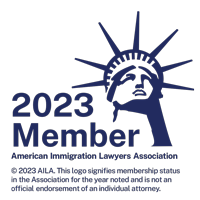How to make it to America… and stay there
Being offered gigs or work in the US is one thing, but getting over there – and staying there – is another matter altogether. If you’re considering touring the US or relocating there for a period of time, you’ll need a visa.
The process can be lengthy, complicated and confusing, so it’s best to call in an expert to help you navigate the system.
Ahead of her workshop at BIGSOUND and a special APRA AMCOS session, we spoke to Andrea Szew, the founder and managing attorney of US law firm Szew Law Group, to gain some insight. Andrea has been an attorney for over 18 years, and has obtained US visas for hundreds of artists, producers, bands and crew members throughout the entertainment industry.
When do Australian musicians need to get a visa for the US and which visas are required?
All artists need to obtain a work visa to perform in the US, whether or not they are compensated. The most common visas used for artists are O visas (individuals who have extraordinary ability in the arts), P visas (individuals that are part of a group that is internationally recognised) or P-3 visas (individuals coming to perform in a culturally unique performance).
What about artists that are not performers?
Non-performing artists that are essential support crew usually enter with essential support visas. They apply with the primary O or P applicant and must prove their essentiality and relationship. If they are not essential support personnel and are extraordinary themselves they can qualify for their own O visa. If they are not able to qualify as either support personnel or as an extraordinary individual in their field, then depending on their role they might be able to use the E-3 professional visa.
In order to qualify for the E-3 the applicant must have a professional degree from a university or its equivalent and be offered employment in a position that requires the degree they have. The employment must be full-time or part-time, but they must be paid the prevailing wage required by the Department of Labor. Types of professional jobs that could possibly qualify for this visa in the music industry are music directors, producers, managers, etc.
What documentation is required?
This depends on the visa being applied for, but in general, an artist will need:
- A petitioner – “sponsor” – the one who will sign your forms and be your representative in the US.
- Work – you need work lined up in the US. The USCIS (United States Citizenship and Immigration Service) does not grant visas to people who do not have work lined up already.
- Evidence of your qualifications – usually if you are applying for an artist visa (P or O), you must show that you are outstanding and/or extraordinary in your field. Gather news media about yourself; make a list of events and/or organisations (companies/agencies) where you played a critical and/or lead role; contact extraordinary individuals in your industry who are willing to write letters stating that you are extraordinary.
How long does it take to get a visa?
Again, this depends on the visa that a person is applying for, but once they are prepared for submission, most artist visas (P or O) can be expedited to have a 15-day turnaround in the US (through “premium processing”). Those who pay for premium processing are guaranteed an answer within 15 days. Once a visa is approved, applicants have to check with their local US consulate to schedule an appointment to pick up the visa before heading to the US. If someone chooses not to pay the extra fee for premium processing, then the processing times change based on when and where they file. Unfortunately, there is no guaranteed processing time when not doing premium processing.
What costs are involved?
It depends on the visa and if choosing to hire an attorney to help with the application process. Fees for attorneys range greatly depending on the attorney, their experience, the services and attention they provide, their reputation within the community, and who performs the work on the case (a paralegal, an assistant, or the actual attorney).
Currently, the government filing fees are approximately US$2,000 for expedited non-immigrant visa applications, including getting the visa at the US Consulate. There is no straightforward answer because every process has a different fee depending on how and where it is applied for, and if premium processing is offered or used.
Can artists apply for the aforementioned visas while in the US?
Yes, they can apply in the US if they are in a status in the US that will allow them to “change status” (non-immigrant visas). If they enter the US on the Visa Waiver Program, then they cannot change their status and must return home to Australia to obtain their visa, once approved. If they are in the US on a visa already, such as a B1/B2 visitor visa, they can change or adjust their status while in the US.
What are the ramifications if artists don’t get visas?
If artists are caught entering without the proper visa, they will likely be turned away and sent directly back home, losing their right to use the Visa Waiver Program in the future. Even worse, if they lie or omit essential information about their trip to the customs officer at the border, they could be held to have committed fraud or misrepresentation, causing them to be barred from returning to the US for a specific period of time or indefinitely.
This is always a hard issue to talk about because everyone knows artists who enter the US without a proper work visa and nothing happens. Yes, many do, but many who fellow artists do not hear about don’t make it across and suffer the consequences mentioned above. It’s better to understand the risks before artists attempt to do something they might regret later.
What are some of the common pitfalls for Australians when it comes to applying for visas for the US?
One of the biggest pitfalls I see for Australians applying for visas is not taking the time to gather the proper information regarding the qualifications required for the visa they are applying for prior to hiring an attorney and applying for the visa. Unfortunately, there are many attorneys, in the US and worldwide, who will take money and promise the world to their clients, even if the attorney knows that the application will never get approved. Artists have to be prepared to possibly hear, “You are not ready yet to get the visa that you want” and listen to what needs to be done in order to prepare them for success in the near future.
I encourage and advise artists to:
- Do your own research and speak to a few attorneys who have been recommended.
- Talk to other people in the industry who more or less have the same background as you, and see who they used and what their experience was.
- Never go to an attorney or an agency that says that they will get you representation, create fake media that you need for the visa application, and get you work. This is illegal for an attorney to do. If you do not already have possible representation, supporting media, and people wanting to hire you, then you are possibly not ready to apply for the visa you want.
What should artists look for when choosing an immigration lawyer?
In my opinion, the two most important characteristics when choosing an immigration attorney are honesty and integrity. Some things to look out for or ask are:
- Do they refuse to speak to you, even if only for 5 minutes, without you paying a fee?
- Do they tell you to sign a retainer and that they can get you a visa, even before they look at your documentation or even listen to your story?
- Are they way lower in price than most other attorneys?
- Who will be doing the work on your visa? The attorney or a paralegal or assistant?
- How many years has the attorney been doing this type of work?
- How hard is it to get a hold of the attorney on the phone? How many people do you speak to before you get to talk to the actual attorney?
- When you do not have a sponsor or the amount of evidence needed to qualify for a visa, do they say, “Don’t worry; we will handle that” or “We will be your sponsor or we will get you one”?
- Never use an attorney who has in-house publicity departments or agreements with managers or agencies! This is illegal and grounds for them to lose their license.
- Talk to your fellow artists who have had successful visa applications and who are extraordinary in their field and see who they used.
- Lastly, go with your gut and ask lots and lots of questions. A lawyer should NEVER get annoyed with a client who asks a lot of questions…that is what you are paying them for!
Andrea Szew will be in conversation with Chit Chat at the APRA AMCOS Sydney office on Tuesday 13 September from 10am-11.30am. APRA AMCOS members and their managers are invited to attend to learn more about US visas and immigration. Places are limited and RSVPs are required by Friday 9 September:writer@apra.com.au
The session will be filmed for those who cannot attend.
You can also catch Andrea at the BIGSOUND International touring workshop on Thursday 8 September at 2pm.














